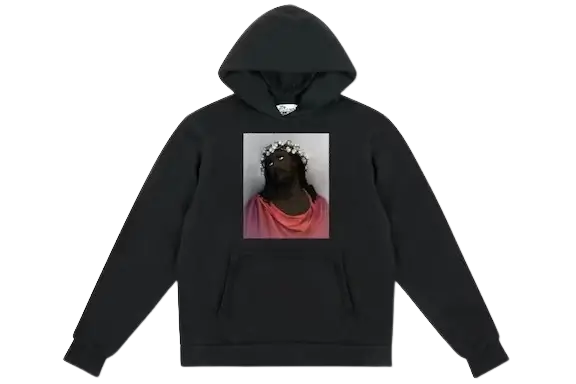Introduction
Denim Tears is a clothing brand that bridges fashion with social commentary, art, and history. Created by Tremaine Emory in 2019, the brand is known for its emphasis on African-American culture and history, utilizing clothing as a medium to explore themes of identity, slavery, and the cultural contributions of Black people in America. Denim Tears is not just a fashion statement but an emblem of resistance, pride, and storytelling.
This article will delve deep into the ethos of Denim Tears, exploring the inspiration behind the brand, its mission, and its role in the larger landscape of contemporary fashion.
The Origins: Who is Tremaine Emory?
Tremaine Emory is a multi-faceted creative, a cultural critic, and a well-known figure in the streetwear community. Born and raised in Queens, New York, he has deep roots in both American street culture and the experiences of the Black community. His early influences included hip-hop culture, graffiti, and street style—elements that would later surface in his work.
Emory is no stranger to the fashion industry. Before launching Denim Tears, he collaborated with major brands like Stüssy, Levi’s, and Off-White. His close association with the late Virgil Abloh gave him an intimate look at how culture and design intersect, fueling his desire to create something deeply personal and historically resonant. Thus, Denim Tears was born—a project that would enable him to express his cultural consciousness and love for fashion through a unique lens.
The Concept Behind Denim Tears
Denim Tears takes its name from the material it reveres and its founder’s desire to shed light on untold stories of pain, resilience, and heritage. The brand is perhaps best known for its signature “Cotton Wreath” design—a powerful statement on the dark history of slavery in America.
The cotton wreath emblem is a bold reference to cotton’s symbolic significance in the lives of enslaved African Americans. Through the use of this design, Emory sheds light on the exploitation, trauma, and resilience of Black individuals whose labor and suffering shaped the early American economy. This emblem is carefully placed on Denim Tears’ signature Levi’s jeans, jackets, and various apparel items, bringing history into the forefront of contemporary fashion.
Beyond the wreath, Denim Tears explores other motifs and narratives that align with Black identity. Emory’s designs frequently draw from African and Caribbean culture, civil rights movements, and musical legacies, establishing Denim Tears as a brand that tells complex stories through simple yet evocative designs.
A Conversation on Cultural Ownership
One of Denim Tears’ central tenets is the exploration of cultural ownership. Emory has been outspoken about the appropriation and erasure of Black culture by mainstream fashion, calling for a more authentic representation of Black history and contributions. Denim Tears emerged not only as a fashion label but as a form of resistance to cultural erasure, asserting ownership over narratives that have been co-opted or diminished.
This conversation extends beyond the clothing itself. Emory often uses social media and public forums to challenge dominant narratives and question the commercialization of Black identity in fashion. He envisions Denim Tears Hoodie as a “cultural conversation piece,” drawing attention to issues that go beyond the surface of style.
Denim Tears x Levi’s: A Collaboration Rooted in History
One of the brand’s most notable collaborations was its project with Levi’s. The Denim Tears x Levi’s collection featured the iconic Cotton Wreath design printed on a range of classic Levi’s 501 jeans and jackets. Emory chose Levi’s as a canvas intentionally—acknowledging the brand’s deep history with American workwear and the symbolism of denim as a fabric tied to the working class and cultural expression.
Through this collaboration, Emory leveraged Levi’s global reach to bring visibility to his mission. Each piece in the collection was carefully crafted to serve as a visual reminder of slavery’s legacy and the lasting imprint it has left on American society. In doing so, Denim Tears elevated what might have been dismissed as “just jeans” into garments that provoke reflection and dialogue.
The collection’s success brought significant attention to Denim Tears, establishing it as a powerful voice in fashion’s ongoing reckoning with race and identity.
Collaborations Beyond Levi’s
Denim Tears has not confined itself to Levi’s alone. The brand has teamed up with other cultural and fashion heavyweights, including Converse, UGG, and Supreme, among others. In each collaboration, Emory prioritizes storytelling and impact, ensuring that every partnership aligns with Denim Tears’ ethos of cultural preservation and critical reflection.
In its collaboration with Converse, Denim Tears reinterpreted the iconic Chuck Taylor silhouette, incorporating African-inspired textile prints and colors. This collection, named “All-Star Tears,” symbolized a merging of African and American heritage, celebrating the global influence of Black culture.
Similarly, Denim Tears’ partnership with UGG reimagined classic footwear through a Black cultural lens. Emory utilized the collaboration to draw connections between the experience of wearing UGGs and Black expression, making a statement on how mainstream trends intersect with Black lives.
Each of these collaborations emphasizes Denim Tears’ mission to fuse art, activism, and commerce—ensuring that each product serves as both a fashion statement and a historical artifact.
Denim Tears as Protest Fashion
Denim Tears is often regarded as “protest fashion,” a term that encapsulates the brand’s commitment to political and cultural discourse. Emory uses his designs to challenge prevailing narratives and confront uncomfortable truths about America’s past and present. Whether it’s addressing slavery, cultural appropriation, or the Black experience, Denim Tears’ collections urge wearers and viewers to think critically.
The brand’s emphasis on history is not performative or fleeting. Emory meticulously researches and consults with historians to ensure that each design reflects a nuanced understanding of Black history. This scholarly approach distinguishes Denim Tears Jacket from other streetwear brands that merely flirt with politically charged imagery without context or substance.
One significant example of this approach was Denim Tears’ collection inspired by James Baldwin. Emory’s admiration for Baldwin’s literary work and activism was evident in his designs, which featured quotes and imagery that alluded to Baldwin’s life and writings. By incorporating these elements into his clothing, Emory not only paid tribute to Baldwin’s legacy but also encouraged his audience to engage with his work.
Artistic Expression and Media Presence
Denim Tears doesn’t limit itself to fashion alone; it extends into various artistic and cultural realms. Emory frequently collaborates with artists, musicians, and filmmakers to further explore the themes central to Denim Tears. Through visual art, photography, and film, Emory pushes the brand’s narrative beyond clothing, creating an immersive and multi-dimensional experience.
The brand’s presence on social media and other digital platforms serves as an extension of its mission. Emory uses these platforms to educate his audience about Black history, social issues, and cultural icons. Denim Tears’ Instagram account, for instance, often features historical photographs, articles, and artworks that emphasize Black resilience, artistry, and defiance.
This dedication to education and cultural enrichment cements Denim Tears’ place within a broader cultural conversation. It blurs the line between fashion and social activism, making the brand not just a clothing label but a cultural institution.
The Cultural Impact of Denim Tears
Denim Tears represents more than a single individual’s vision; it is a reflection of larger cultural movements and historical reckonings. Emory’s work aligns with the rising wave of Black creatives reclaiming space within the fashion industry and beyond. In an era where representation and authenticity are crucial, Denim Tears offers an unapologetic voice that resonates with a new generation of consumers who value meaning and substance in their clothing.
The brand’s cultural impact extends beyond its immediate audience. Denim Tears has been featured in prestigious publications like Vogue, The New York Times, and GQ, signaling its relevance not just in streetwear but in high fashion as well. Through these platforms, Emory has been able to communicate his message to a diverse and influential audience.
However, the brand’s significance is not solely measured by its popularity or media attention. Its true impact lies in the conversations it sparks and the reflections it inspires. Denim Tears challenges the fashion industry to reckon with its history and its complicity in perpetuating exclusionary practices, while simultaneously honoring the contributions of Black individuals to the cultural fabric of America.
Looking Forward: The Future of Denim Tears
Tremaine Emory’s vision for Denim Tears is expansive, and the brand’s journey is far from complete. Emory has expressed a desire to continue exploring untold stories and lesser-known histories through his work. Future collections may delve deeper into the diaspora, incorporating narratives from African, Caribbean, and Latin American cultures.
As the brand evolves, its commitment to truth-telling and cultural preservation remains steadfast. Denim Tears is poised to continue challenging the norms of the fashion industry while celebrating the rich heritage of Black culture. Emory’s dedication to authenticity and purpose-driven storytelling ensures that Denim Tears will remain a significant cultural force for years to come.
Conclusion
Denim Tears Clothing stands as a beacon of cultural introspection and storytelling within the fashion world. It serves as a reminder of the deep connections between fashion, history, and identity, encouraging consumers to consider the legacies embedded in their clothing. For Tremaine Emory, Denim Tears is a labor of love, a reflection of history, and a testament to the resilience and creativity of Black individuals.
Through its designs, collaborations, and broader cultural conversations, Denim Tears Tracksuit has become a powerful tool for reclaiming history, challenging appropriation, and celebrating Black culture. It’s not just about what you wear, but the story that the garment tells. Emory has crafted a brand that weaves together fashion and social consciousness, making Denim Tears an essential voice in the ever-evolving landscape of fashion and culture.




